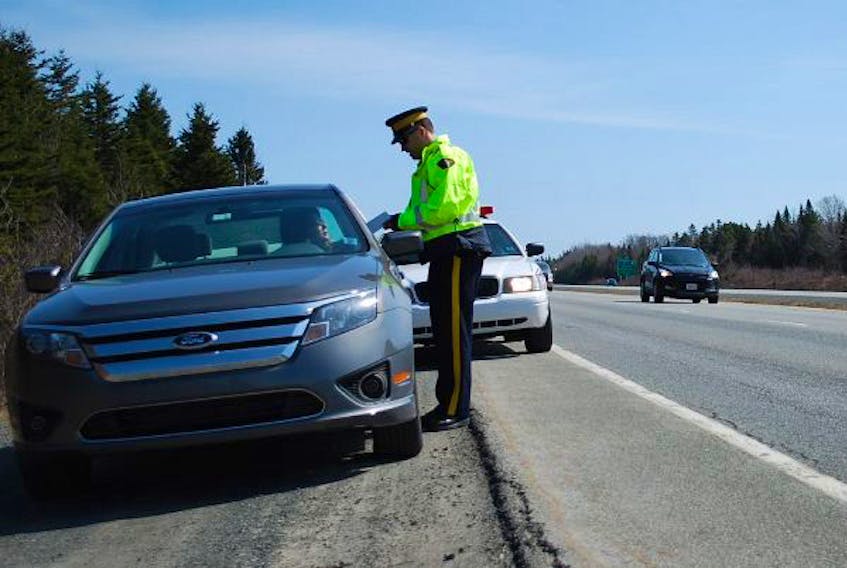AMHERST – Last weekend, RCMP ticketed 24 motorists in the Amherst area for failing to comply with the province’s move over legislation. More than 40 received tickets in the Annapolis Valley three days earlier.
This occurred two months after Amherst RCMP officer Const. Frank Deschenes was struck and killed on the Trans-Canada Highway near Memramcook, N.B. while helping a motorist change a tire.
It has some wondering if people are aware of the legislation and its purpose.
“It’s always been a problem and continues to be one,” Const. Chad Morrison said. “I don’t know why people aren’t getting the message. I think we have to paint a picture as to why it is that we need our space and what an officer is going through when he or she makes a traffic stop.”
Under the 2010 legislation, motorists must reduce their vehicle’s speed to 60 km/h, or the posted speed limit (whichever is the lesser of the two) when passing an emergency vehicle stopped on the side of the highway with its emergency lights on. Motorists are also required to change lanes to the lane furthest from the stopped emergency vehicle if the lane is free and it’s safe to do so.
There are significant fines for breaking the ‘Move Over’ law, ranging from $352.50 to $2,442.50.
What happened to Deschenes is fresh in every officer’s mind when they make a traffic stop. Officers want to expect everyone to abide by the law, but can’t.
Morrison, who works in highway enforcement in the Halifax area, said it’s important for police to be able to focus on the vehicle they’re stopping rather than if it’s safe to get out of their vehicle because they no idea what situation they could potentially be dealing with when approaching a vehicle they’ve stopped.
“There’s a misconception out there that a traffic stop is very routine and that officers are stopping dozens of cars every day. While that is true, there is an unknown that comes with making a traffic stop. You don’t necessarily know who’s in that vehicle or what their intentions are. The majority of stops we do go smoothly but there’s the possibility in every stop that something could go wrong and the officer needs to be focused on that vehicle and its occupants.
“When you add in the fact you have traffic whizzing by you it distracts you and divides your attention. It means you’re now vulnerable to the people in the vehicle as well as the passing traffic and you’re not focusing enough of your attention on anything. You’re leaving yourself vulnerable.”
Retired RCMP officer Paul Calder, who was seriously injured in a 2001 crash outside Amherst, has long been advocating for more awareness of the law recently wrote Nova Scotia’s transportation minister Lloyd Hines asking the government to erect signage on major highways reminding motorists to slow down and move over.
Calder, a 36-year veteran with the RCMP, had stopped at the side of Highway 104 to help a motorist, whose vehicle had left the highway and went into the ditch. His vehicle’s emergency lights were activated and visibility was clear. He was talking to the motorist when a shuttle van struck Calder’s cruiser from behind leaving him with a serious concussion, injured shoulder and pinched nerve in his neck.
He wants to see signage similar to ones he saw in Alberta last year reminding motorists of the slow down and move over laws there. He also wants the legislation expanded to include other service vehicles such as tow trucks.
A response from the department said there are no plans to change its signage policy on 100-series highways.
“Signage on Nova Scotia’s 100-series highways is typically limited to regulatory, warning and guide signs. Research has shown signs have limited effect in changing driver behaviour and can lead to driver distraction and sign clutter,” Mike Croft, manager of traffic engineering and road safety for Transportation and Infrastructure Renewal, said in a letter to Calder.
Croft said there are currently no plans to change the legislation to include service vehicles such as tow trucks since they are often operating at locations where other emergency vehicles, covered by the legislation, are working.
Twitter: @ADNdarrell









